Declining a meeting can get daunting, but if you have valid reasons and believe in clear communication, turning down these official occasions will not be as frightening as you think. While providing a clear, concise reason for your decision, civil language and respectful behavior are also equally important.
Moreover, if you want to make the process of rejecting any meeting less stressful, knowing how to decline a meeting politely can be of great help.
Reply Early and Be Confident About Your Reason
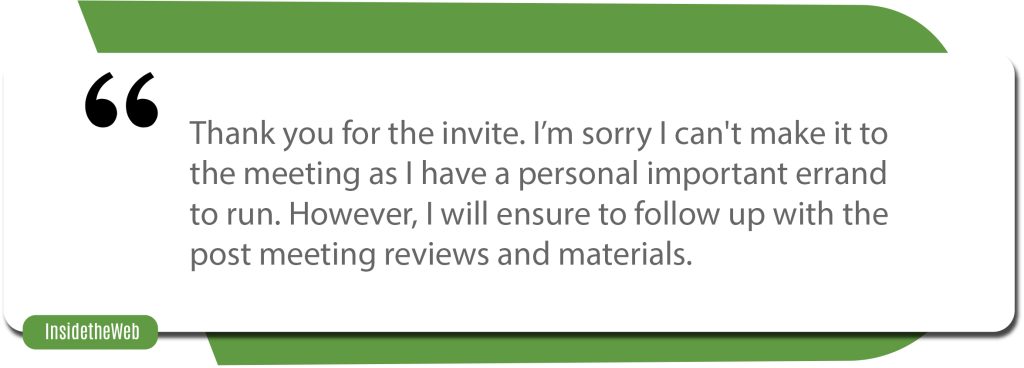
If you have a prior commitment or an abrupt crisis turns up, do not wait till the last minute to flash the news of your nonattendance. Just be assertive about your reason and, without hesitation, inform the appropriate authorities at least a day or two ahead of the meeting.
If someone senses a tiny bit of underconfidence in you, then they will have second thoughts in believing that individual—and chances are it might not even go in your favor. Therefore, it is important to hold your confidence.
Example: Thank you for the invite. I’m sorry I can't make it to the meeting as I have a personal important errand to run. However, I will ensure to follow up with the post meeting reviews and materials.Focus on Being Concise and Clear
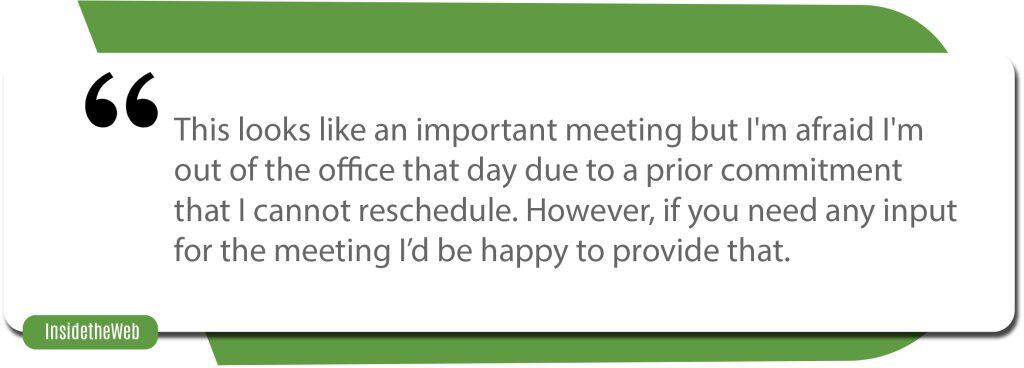
The explanation regarding why you are not able to attend the meeting should be kept short and to the point.
Unnecessarily playing with the words can be avoided while explaining the reason behind your absence. Make sure you are not swaying away from the main purpose i.e., politely declining a meeting.
Example: This looks like an important meeting but I'm afraid I'm out of the office that day due to a prior commitment that I can not reschedule. However, if you need any input for the meeting I’d be happy to provide that. Be Courteous and Show Gratitude
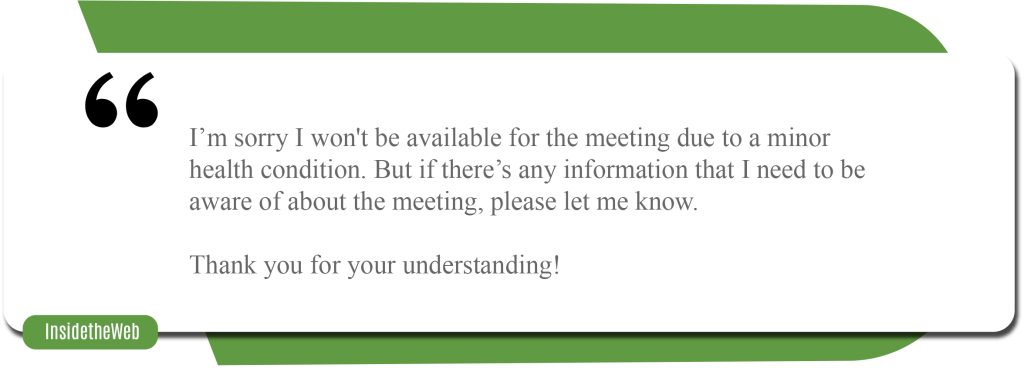
It is important that you maintain certain dignity of yourself and the individuals that are organizing the meeting by behaving in a respectful manner.
Just because you are turning down the meeting does not give you the right to misbehave with the people who are involved in the meeting.
Example: I’m sorry I won't be available for the meeting due to a minor health condition. But if there’s any information that I need to be aware of about the meeting, please let me know.
Thank you for your understanding!Stay Professional and Offer Your Assistance
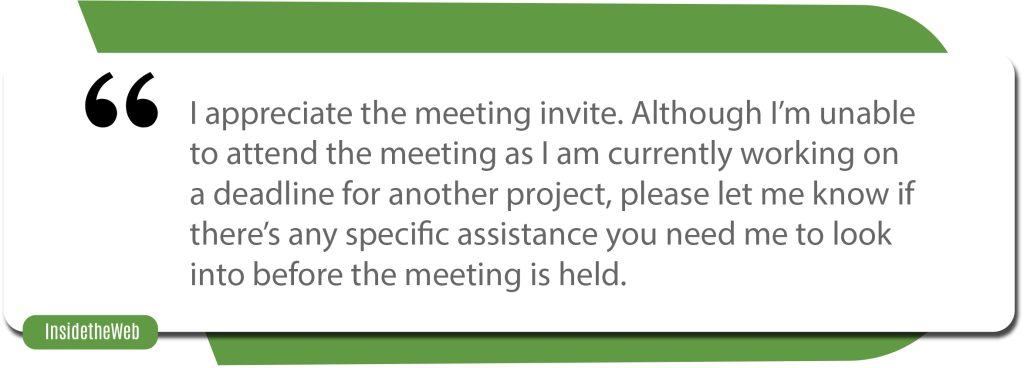
Maintaining professionalism is an important aspect of any workplace. Be aware that you aren’t breaching any code of conduct or being informal while talking your way out of the meeting.
Notify the appropriate body regarding your absence and offer any kind of assistance that you are able to provide in that scenario despite not attending the meeting, such as helping the organizing team, documentation, or even technical assistance.
Example: I appreciate the meeting invite. Although I’m unable to attend the meeting as I am currently working on a deadline for another project, please let me know if there’s any specific assistance you need me to look into before the meeting is held. Recommend Someone Else If You Can
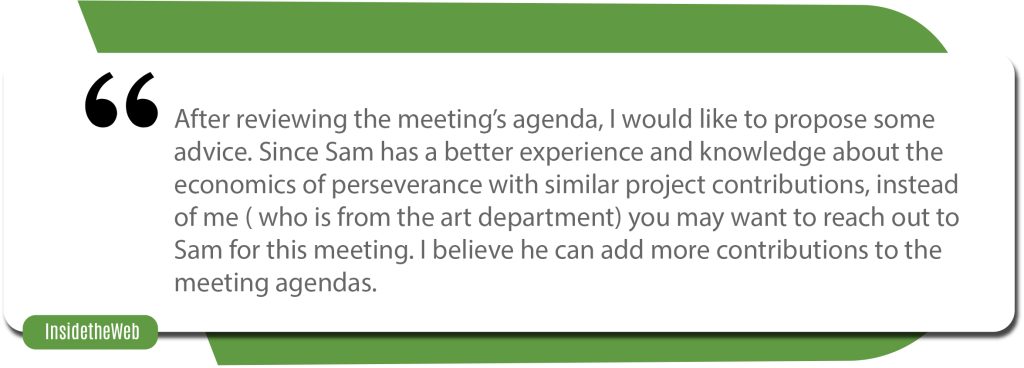
Instead of simply declining the meeting, look out if you can make someone who is a fit option to attend it on your behalf. This is a win-win for both you and the meeting organizers.
But keep in mind that you inform the designated people and have their consent before you put someone else’s name in.
Example: After reviewing the meeting’s agenda, I would like to propose some advice. Since Sam has a better experience and knowledge about the economics of perseverance with similar project contributions, instead of me (who is from the art department) you may want to reach out to Sam for this meeting. I believe he can add more contributions to the meeting agendas. Don’t Over-Explain and Choose Your Words Wisely
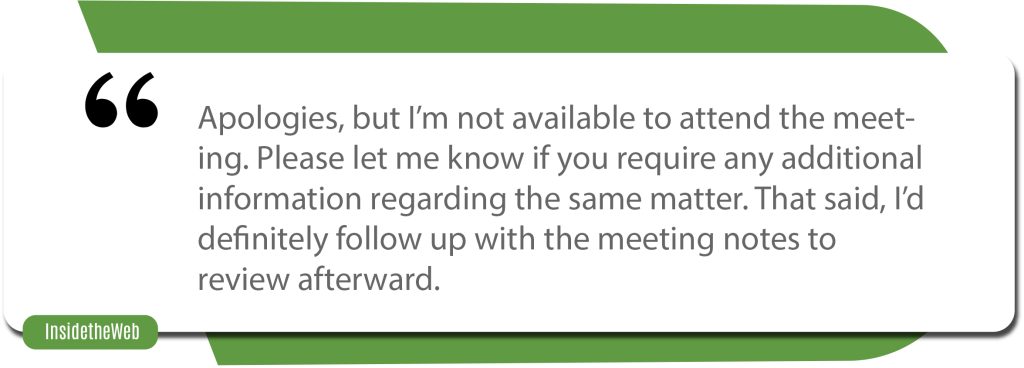
At times one can go overboard with their refusal of explanation. While you should try to keep it short and to the point, it is also necessary to pick the right words and deliver.
That is why prepare what you’re going to say beforehand and practice saying the same thing out loud to yourself. And just like that, you will get used to saying the right facts, and there will be less chance for any word errors.
Example: Apologies, but I’m not available to attend the meeting. Please let me know if you require any additional information regarding the same matter. That said, I’d definitely follow up with the meeting notes to review afterward. Offer Other Alternatives
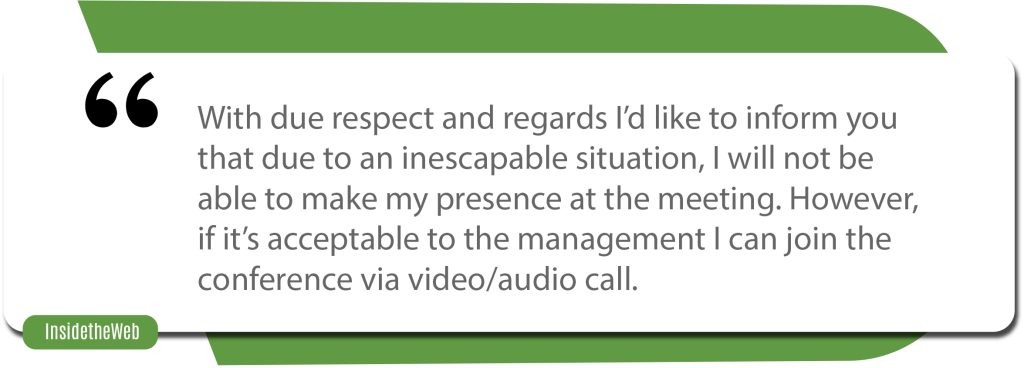
It is always a good idea to offer an alternative solution whenever you are refusing any offer. The same goes for the formal setting of work. Don’t just decline the meeting and leave it as it is. Brainstorm ideas and meeting components before you inform the appointing authority.
After that, you will be able to think accordingly about the alternatives that would be apt to put in front. For example, if the meeting can be postponed, reevaluate certain objectives of the meeting.
Example: With due respect and regards I’d like to inform you that due to an inescapable situation, I will not be able to make my presence at the meeting. However, if it’s acceptable to the management I can join the conference via video/audio call. Turn the Meeting Into an Email (for Now)
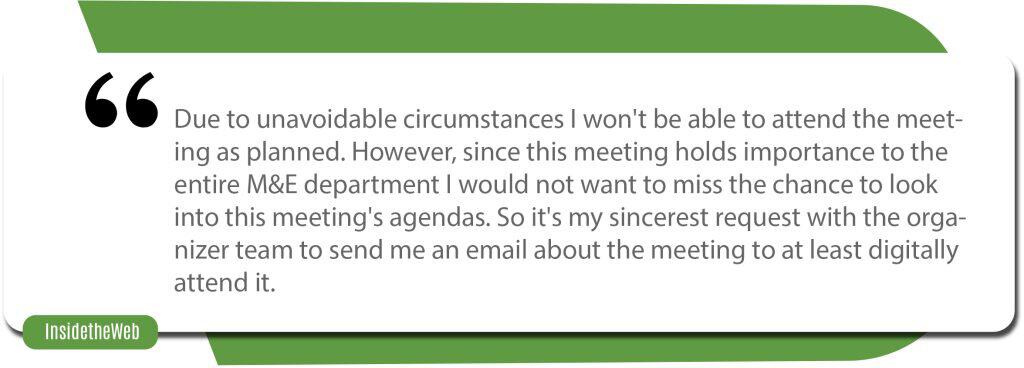
You can always request the appointing authority to provide you with details and findings of the meeting in an email. This way, you will not miss out on the important facets of the meeting.
Also, don’t forget to double-check if the meeting can actually be summarized in an email and consult about this matter beforehand.
Example: Due to unavoidable circumstances I won't be able to attend the meeting as planned. However, since this meeting holds importance to the entire M&E department I would not want to miss the chance to look into this meeting's agendas. So it's my sincerest request with the organizer team to send me an email about the meeting to at least digitally attend it. Apologize and Notify the Attendees
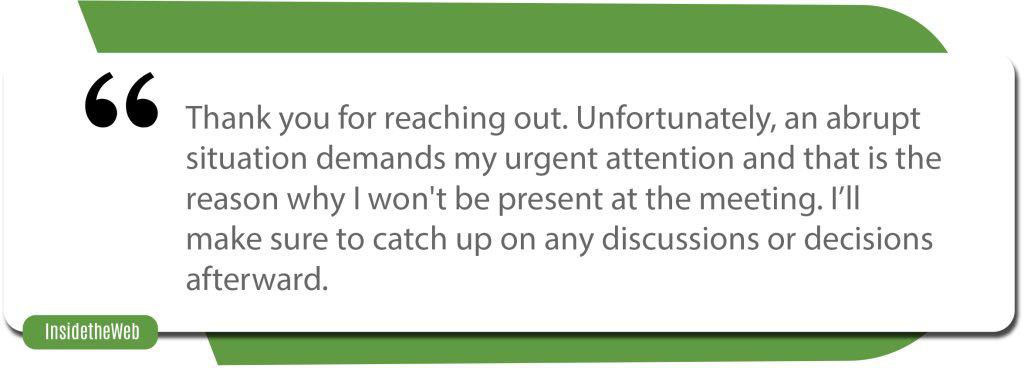
In terms of formal settings, notifying and apologizing for any inconvenience caused is a good way to go about it, especially if you are declining any request or you are one of the main members arranging the meeting. So, make a point to send a formal apology to the attendees and let them know about your circumstance.
Example: Thank you for reaching out. Unfortunately, an abrupt situation demands my urgent attention and that is the reason why I won't be present at the meeting. I’ll make sure to catch up on any discussions or decisions afterward. Offer a New Time to Arrange the Meeting
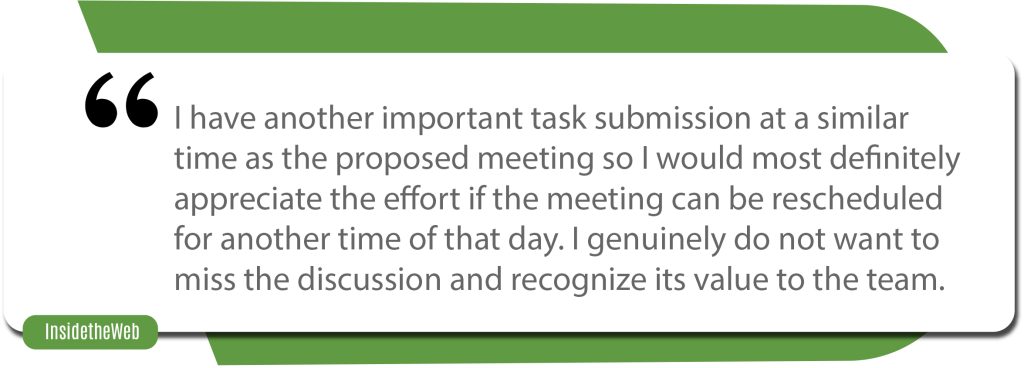
If you are unable to attend the meeting due to timing issues, you can always put a thought about postponing it to the concerned officials. This way, it will seem like you want to attend the meeting, so give them a proper description of why rescheduling the meeting will not cause a great loss to anyone.
Example: I have another important task submission at a similar time as the proposed meeting so I would most definitely appreciate the effort if the meeting can be rescheduled for another time of that day. I genuinely do not want to miss the discussion and recognize its value to the team.Turn the Meeting Into a Phone Call
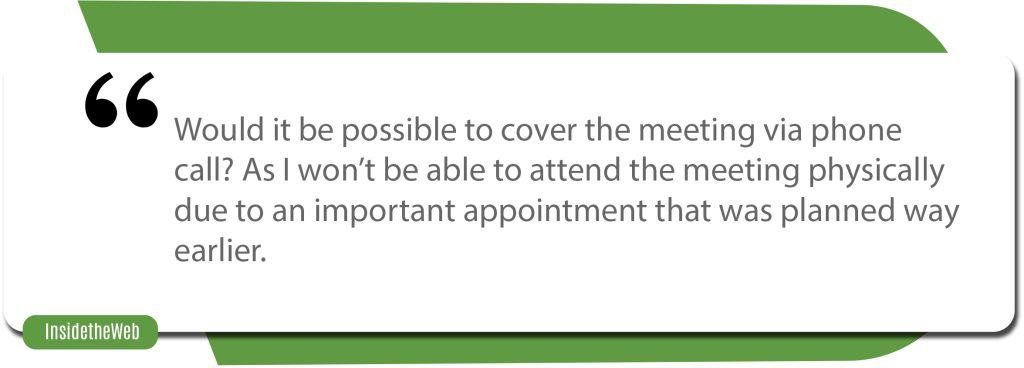
Since informal meetings do not require a formal setting, turning the meeting into a phone call can work well in situations where you are physically not able to attend a conference or gathering.
Example: Would it be possible to cover the meeting via phone call? As I won’t be able to attend the meeting physically due to an important appointment that was planned way earlier. Share Your Calendar
If you have shared your Google Calendar with the HR department, then chances are they will set the meeting in a way that will be attainable for all the participants.
So make sure that you have marked your calendar booked on those days when you are busy. And now, if you still get a meeting invite on a day that you already have other work, then the ultimate option is to talk to your meeting organizers and politely remind them to check your shared calendar dates.
Reject Them How You Would Want Someone to Reject You
When you put yourself in others’ shoes, you tend to understand and grasp a better perspective on various other things. Hence, keep yourself in the place of your meeting organizer and then analyze the situation.
Now, think about how and what you would want someone else to come and tell you about declining the meeting. This way, articulate your thoughts and accordingly react to your situation.
Send a Card or Gift
If it is an informal event, you can always make a nice gifting gesture, such as sending a card or present. It not only shows that you truly regret not attending the meeting but also adds in that thoughtful element and encourages a long-term bond without much hassle.
So, if you are declining a meeting, don’t shy away, and by maintaining an ethical boundary, you can always send an apology present.
Honesty is the Best Policy
No matter how old the proverb is, honesty is simply the best policy in terms of any work setting.
Simply be honest about your situation and reason for declining the meeting in an appropriate manner. This is the most practical and good moral behavior to have at any workplace. Your organization and office people will also highly appreciate this kind of etiquette.